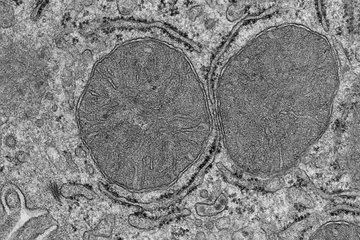Stress hormones can lead to enhanced cognitive abilities in the child
Study proves connection between stress hormones and altered brain structure
Researchers investigated how stress hormones affect the early development of brain cells in the cerebral cortex of fetus. The cortex is the crucial area of the brain for thinking. A team at the Max Planck Institute of Psychiatry was able to demonstrate causal links between stress hormones and altered brain structure which relate to higher level of educational attainment later in life.

The hormone group of glucocorticoids is crucial for the regulation of our metabolism and immune response, but also for the development of organs such as the brain and lungs before birth. The hormones are released in response to stress and can travel from the mother to the fetus. One of the best-known stress hormones is cortisol. Synthetic forms are prescribed, for example, in pregnancies at high risk for preterm delivery in order to help the maturation of the fetal lungs.
"We found that glucocorticoids, when present early in gestation in the first or early second trimester, increase the number of a particular type of brain cells that are formed very early in development (called basal progenitor cells)", reports Anthi C. Krontira, who led the study, and continues: "These are cells that are important for the growth of the cerebral cortex." The cortex is the most developed region of our brain, the center of our thinking, if you will.
The scientists used so-called brain organoids for their investigations. These are models of the developing brain that are derived from human skin or blood cells and mature in a petri dish. They reproduce early developmental stages of the maturing brain and thus provide insights into the first steps in the development of a human brain.
Glucocorticoids act via a protein called ZBTB16 to alter the development of cortex and this results in the production of more neurons. The researchers looked in detail at a genetic variant that leads to an increase in ZBTB16 levels in response to glucocorticoids: They found causal relationships with altered brain structure and higher educational attainment later in life. This connection was further supported by data from a study following pregnant women and their offspring.
Time of pregnancy is crucial
Many studies in the past have shown that glucocorticoids when present late in gestation, in the third trimester, they cause adverse effects for the offspring including loss of neuronal connections and increased risk for psychiatric disorders later in life. “Our study shows that the same hormones when present early in gestation can have an opposite effect”, reports Krontira.
This is related to neurogenesis, the process of producing neurons from progenitor cells, which is active in early but not in the late gestation. “We found that glucocorticoids early in gestation increase progenitor cells and neurons and this relates to beneficial phenotypes for the offspring such as increased cognitive abilities”, explains Krontira. The same results wouldn’t be possible for glucocorticoids late in gestation as then the production of neurons from progenitor cells does not happen anymore.
"Our research uncovers a pathway at the cellular and molecular level that explains how glucocorticoids influence the development of the human cortex, with potential consequences for cognitive abilities and brain structure later in life", summarizes Institute´s director Elisabeth Binder. Knowledge of these earliest developmental processes is significant as it could enable therapeutic approaches at such an early stage of human development via the mother.












